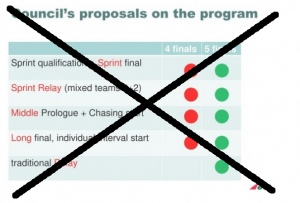
While the IOF killed the WOC in the Future project in January, the Nordic Orienteering Federations believe that the WOC in the future project should be thoroughly evaluated and brought to a conclusion at the General Assembly in 2012. Consequently the Nordic Orienteering federations submitted a new proposal for a split WOC to the General Assembly at the last possible day – March 20th.
Update March 22nd 12:00: Switzerland and Italy have also submitted proposals for a new WOC program – see the details here. The Swiss proposal suggests to keep a yearly WOC week, but include a chase start event and get rid of the qualification races for long and middle. The Italian proposal suggests to get rid of qualification race for long, include a mixed relay. It also includes a specific form of spreading for the long distance.
The Nordic proposal is to organize a “Terrain” WOC and “Urban” WOC in alternating years.
- The terrain WOC would include the existing Middle, Long and Relay disciplines plus one additional “first-to-finish” discipline [Editors comment: Suggested to be 25 minutes prologue + 25 minute chasing start]. Qualifications for the middle and long distance races would be based upon some form of nation strength system. The new additional distance and relay would be open to equal participation for all nations.
- The urban WOC would include the existing individual start sprint discipline (with qualifications and final), a knock-out sprint discipline based upon the experience of the World Cup (NORT) and a sprint-relay. For the urban WOC, equal participation of all IOF nations for all distances will be possible.
You can read the complete proposal as submitted to the IOF here (English text) – for comparison here is the suggestion by SOFT last November – which is similar in most respects.
First “Terrain” WOC in 2016
It is proposed that the first “Terrain” WOC is organized at the latest in 2016 and the first “Urban” WOC 2017. Note that 2016 is the year Sweden will most probably be WOC organizer, whereas China may be a possible organizer for a sprint WOC in 2017.
Relating these goals to the current WOC format we do feel that it is appropriate to make changes to the current WOC program, as it is limiting in reaching these goals.
Analysis
The proposal from the Nordic countries is very well built up – building the proposed program on a vision for the future WOC and a set of goals. This type of argument was missing in the original proposed WOC in the future program from the IOF – and it surely strengthens the chances for the program to succeed in getting support at the General Assembly in Switzerland in June.
Looking back to the World of O article on the topic from August 2010 where I argumented for a split WOC as a very good alternative compared to the IOF proposal, the NORD suggestion is nearly identical to the program suggested there. Repeating and expanding on some of the arguments from that article:
- There will be room for both the traditional long distance, the middle distance and a first-to-finish event.
- Both a KnockOut sprint, a traditional sprint (possibly also both city sprint and forest sprint) and a sprint relay can be introduced into the program – disciplines which are easier to master for the less developed orienteering nations
- The Sprint WOC will be easier to organize for less developed orienteering nations, making it easier to spread orienteering to new nations. An urban WOC program can be organized in many locations where it would be difficult to organize a terrain WOC and vice versa.
- A Sprint WOC could be one of the best roads towards the Olympic goal of the IOF.
I still believe a split WOC is clearly the only good option if the premise is that you need to introduce new disciplines in order to develop the sport in the right direction – which was an important premise in the WOC in the Future project. But:
- If you would take the “need” for new disciplines out of the equation, there are still several advantages with splitting the WOC – but the picture is less clear. It might however be quite plausible that a sprint WOC would attract more nations 10-15 years from now than a combined WOC would do with today’s program. And if this is the case, that should be an important reason to go for a split WOC..?
- The need for new disciplines is also a more difficult question to answer. The two new sprint disciplines (Sprint relay and KnockOut-sprint) will both potentially make it easier for developing orienteering nations to fight higher on the results lists – and the (short) chasing start might give excitement which can be beneficial for TV broadcasts in the future.
Seen from the smaller nations view, there is still a problem with the qualification scheme, though. This is also recognized in the suggested proposal, which states
We recognize that exact qualification rules need further development and feel that this can be achieved within a reasonable timeframe for a future WOC program. There seems to be agreement that qualifications races, as currently run at WOC, can be removed from the program. But none of the qualification methods presented so far have received broad agreement among member federations.
A result of the suggested program & qualification scheme for the Forest-WOC is, as far as I can see, that only around 12 countries will have a reason to have more than 1+1 runners present for more than the last weekend (which contains the chasing start and the relay). This can be seen as positive (lower cost for these nations, larger chance that they send a full 3+3 team for the last weekend), but would probably be seen more as negative by the smaller nations as it could reduce the value of the Forest-WOC for many of the smaller nations. For the majority of runners present at the Forest-WOC (assuming the same number of participants as today) there would now only be two races to start in.
The proposal by the Nordic countries however opens for more runners in the final by stating “Based upon feedback from TV producers we also feel that qualification rules can be quite generous as long as the use of seeded starting groups, with the best ranked runners starting at the end of the starting field, are established” – and there is also a proposal for a IOF working group, led by Council, to define exact qualification rules.
Conclusions & Your opinion
The conclusion: Splitting the WOC in two separate parts is a complex matter – and I feel that it has too many good sides to be dismissed without a being handled properly. I therefore welcome the proposal from the Nordic countries, and feel that the best way forward would be that an IOF working group should be formed to evaluate the consequences of a split WOC, to define the disciplines to be included, to define the qualification scheme and to define test events for the new suggested disciplines and put these test events on the international fixtures list.
What is your opinon? Do you welcome a split WOC model?
Read more
Read more about the proposed program in the links below.
- Complete proposal as submitted to the IOF (English text)
- Swedish O-Federation about the new WOC program (Swedish)
- Norwegian O-Federation about the new WOC program (Norwegian)
- Danish O-Federation about the new WOC program (Danish)
 World of O News
World of O News
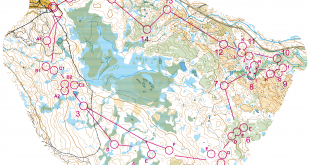
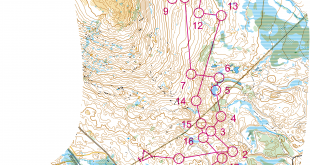
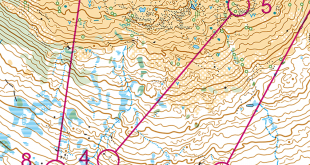

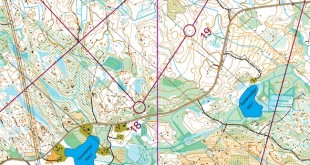
I find it very interesting, specially that the Urban WOC is placed in leap years. I think this can give more focus on the World Games. Where we can promote Orienteering if we want it to be a Olympic discipline.
The day when KO sprint will become an official World Orienteering Championships distance will be a sad one..
Nordic federations, if you like group orienteering and pure running in easy towns, please don’t impose it to the rest of the world!
Lucas >> No one asks you or your friends to stop orienteering in an extraordinary complex and diffult terrain, as does no one (maybe except you) ask anyone not to do sprint orienteering or KO sprints. It is two different things and can exist along each other. The proposal set up by the nordic countries seems to be the only one which satifies the wishes of most people.
Orienteering is a fantastic sport and can be done any where as long as you have a map. Sometimes it will be done alone in super sweet,tough and difficult unknown terrain, at other times it will be done head-to-head in an simple superfast urban terrain. No matter what, it will still be orienteering, but it is just two different disciplines.
Lucas >> No one asks you or your friends to stop orienteering in an extraordinary complex and diffult terrain, as does no one (maybe except you) ask anyone not to do sprint orienteering or KO sprints. It is two different things and can exist along each other. The proposal set up by the nordic countries seems to be the only one which satifies the wishes of most people.
Orienteering is a fantastic sport and can be done any where as long as you have a map. Sometimes it will be done alone in super sweet,tough and difficult unknown terrain, at other times it will be done head-to-head in an simple superfast urban terrain. No matter what, it will still be orienteering, but it is just two different disciplines.
I agree with Lucas
I agree with Lucas! Let it be as it’s now! I like it. We don’t need any changes.
I have a feeling that getting (or trying to get) into the Olympics will modify the sport. In my opinion, sport is for participants not for spectators. But I guess, professional sport is a show nowadays.
Hopefully, if people (mass participants) will love the current forest orienteering format, it will continue to live on at least for non-elite events.
XL >> Don’t get me wrong, I have absolutely no problem with sprint or urban orienteering, and I like it, even if I don’t think it is the most interesting with our sport. And the proposition of a “sprint world champ” held every second year may be good, I haven’t really thought about that. But come on, KO sprint, as it has been run previously (at least in Stockholm and Göteborg), is everything but interesting or challenging orienteering. It is more a tactical running race with a map, and it is not even that enjoyable to watch…
Exactly, it is something different compared to any other discipline. I was present at both races and it was extremely interessting to watch live. The intensity during each heat was ever increasing the closer the runners got to the finish. I don’t think KO sprint can be compared to normal orienteering, as the head-head aspect changes the tactics dramaticaly. But take a look at the runners in the finals, who shouldn’t have been there?
Nice to hear that some are still working for improving the attractivity of orienteering ;-)
Some comments about the 3 suggestions
1) The word “olympic” is in the Scandniavian proposal, not in the 2 other. Don’t dream. Orienteering will NEVER be olympic. There are too much reasons against orienteering in Olympics (security, fairness, etc…). Even sprint orienteering would be impossible for olympics, if you consider the security problems during the olympic marathon, for example. And World Games cannot be compared with olympics in this case
2) The definition of orienteering (looking at wikipedia) : Orienteering is a family of sports that requires navigational skills using a map and compass to navigate from point to point in diverse and usually unfamiliar terrain, and normally moving at speed.
-> considering last KO sprints world cups : KO sprint is not orienteering.
3) With 7 different world champion titles compared to the 4 actual titles, orienteerig will loose visibility for the big public on my opinion. In the countries where this sport is not in the common culture, it’s already hard to explain what are the differences between the 4 actual races. How would it be with 7 different races , every 2 years? Which sport is doing like that with 2 different kind of world champs every 2 years? On my opinion this is the biggest weakness of the nordic proposal
4) Long distance seems to be a problem in any case, and IOF members have to find a real solution about start interval/spreading method, and even more without qualification races.
For all these reasons, the Swiss proposal seems to be the best on my opinion.
“Which sport is doing like that with 2 different kind of world champs every 2 years?”
I think that Forest/Urban WOC shouldn’t be seen just as two different champs. The concept is very similar to Athletics. You have outdoor and indoor Athletics world champs. You have 60m and 100m Sprint and some disciplines are the same at both champs. Indoor is not so popular among athletes but IAAF is still able to sell this product.
If IOF first task is to spread the sport onto global level than Urban WOC is the best solution. I think people on Malta or elsewhere where doesn’t have forest these new disciplines could raise the profile of orienteering on global level. I think we shouldn’t talk just about technical aspects and differences in difficulties of forest/urban orienteering events. Both events need map and this is in my opinion enough that people can decide if this sport can be interesting for them or not.
PWT already proved that this concept could work. It is more about what kind of product we could make out of Urban WOC. Yes, it is possible that Urban WOC would become a crap for many people but if we can sell the product than it will not be a crap because athletes will get a chance to be promoted as global sportsmen. To be innovative we must look what other sports did to go beyond their traditional barriers to became more global sports than before. If we could preserve our traditional orienteering in this process than I think it is worth to try with this concept and to find out if orienteering can became a global TV sport.
I don’t know what kind of visibility you have in mind but orienteering as a TV sport have very poor image. Ordinary people on Malta don’t know nothing about forest orienteering. If our goal is Olympics and orienteering as a TV sport than we should ask ourselves what Urban WOC could bring us on that path. Could orienteering became more professional sport and more acceptable for people around the world.
2 different kinds of World Champs:
Athletics – Indoor/outdoor (mentioned by Samo)
Cycling – track/road/bmx/mtb X-country/mtb downhill
Swimming – long and short course (50m/25m pool) and open water
Volleyball – indoor/beach
Soccer – indoor/outdoor
Cricket – One day/T20 World Cups
Canoe – slalom/flat racing (Flat has two events in Olympics with different type boats!)
There are many other examples.
Orienteering already has two other disciplines with their own World Championships (Ski/MTB) why not another one?
I can’t find any sense in creating more disciplins and more titles. Nobody will remember the names of the champions. Years ago there were only one male and one female individual world champion every two years.
Many names are still recognized today.
Right now we have six times as many world champions! Who remembers the names of all of them? Who will remember them in 10 or 20 years? And should there be even more? It will no longer be that special to become world champion or earn a medal!
We now have (besides the relay) three clearly different disciplins of foot orienteering. And already now for many people (also some organizers!) it is difficult to understand the differences between them.
Less is often more! – So just keep WOC as ist is!
Sport is for fun, not for remembering names. The more WOC races, the more fun.
For who is this important??? Who will remember??? The one who became worldchampion, his/her family and friends remember for the rest of their lives. Don’t underestimate the work and effort before and the glory after the titel. Someone who says competing is more important than winning never won.
FML…
NORD Proposal:
‘Having more competitive nations and athletes at WOC should improve with this program. Success in urban disciplines is perhaps easier for new nations to achieve.’
I have a rather retro perspective here.
-> pwt since 1996.
-> sprint on WOC since 2001
We indeed have a sprint-tradition and also a sprint-experience.
1) We did not see new countries raise to sprint nations (except the Swiss :-P). [Basically because sprint is not ‘easier’, but an absolute WOC-worth discipline]
2) We learned the poor suitability of sprint as a TV format (see f.ex. WOC2011).
3) Sprint hasn’t turned out to attract more spectators than those taking part at the spectators-event (minus those who had to catch the train :-).
4) Sprint has not brought us closer to the olympics.
Again:
‘Having more competitive nations and athletes at WOC should improve with this program. Success in urban disciplines is perhaps easier for new nations to achieve.’
What did they learn?